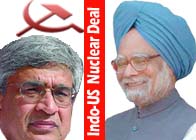Manmohan Singh says Lefts'' exit will not affect UPA Government
 Toyako (Japan), July 8 : The Prime Minister, Dr. Manmohan Singh, on Tuesday, said the decision of the four Left parties -- CPI, CPI (M), Forward Bloc and Revolutionary Socialist Party of India (RSP) -- to withdraw outside support after more than four years of association, would affect his government.
Toyako (Japan), July 8 : The Prime Minister, Dr. Manmohan Singh, on Tuesday, said the decision of the four Left parties -- CPI, CPI (M), Forward Bloc and Revolutionary Socialist Party of India (RSP) -- to withdraw outside support after more than four years of association, would affect his government.
Suggesting that the UPA Government has worked out a viable political alternative, without mentioning the Samajwadi Party, Dr. Singh said: "It (Left withdrawal of support) will not affect the stabilty of my government."
The statement came hours after a meeting with Chinese President Hu Jintao, and a several other leaders attending the Group of Eight Summit in this resort near northern Japan''s Hokkaido City.
Earlier, addressing media persons in the capital after a meeting of Left parties, CPI (M) General Secretary Prakash Karat said they would submit the letter of the withdrawal of support to President Pratibha Patil on Wednesday.
"We have sought an appointment from the President tomorrow to deliver our letter about the withdrawal of support to the Centre," Karat told media persons.
He said the Prime Minister had announced en route to Japan yesterday that his government would go to the International Atomic Energy Agency (IAEA) soon to discuss a safeguards agreement with regard to the Indo-US civil nuclear cooperation deal.
"The text of the IAEA agreement should be placed before the countrymen. We fail to understand why the Centre is hiding it from the people," he said, adding that since the government has finally decided to go ahead on the deal, "The time has come for us to withdraw the support."
Dr. Singh, who officials here say has already received an assurance from President Hu Jintao that China will extend cooperation to India in the civil nuclear sector, will meet U. S. President George W Bush and other influential members of the Nuclear Suppliers Group (NSG) on Wednesday and seek their support for the civil nuclear cooperation with the U. S.
Singh will undertake a two-hour early morning drive for his meeting with Bush in Toya, about 200 km from Sapporo, a place where all the G-8 leaders are staying.
The meeting is slated to take place before 8 a. m. after which the Prime Minister will have a breakfast meeting with the G-8 and O-5 outreach countries leaders.
Singh is expected to brief Bush on the recent political developments in which he has won new and crucial political support for the deal at home in the face of severe opposition from the Left and the possibility of overcoming problems in Parliament from the Left action.
The government''s plans on approaching the International Atomic Energy Watchdog (IAEA) for securing an India-specific safeguards agreement and moves for taking the matter to the NSG are expected to figure in the discussions with Bush.
The Prime Minister has pointed out that the US was committed once India takes the decision the US will have to fulfill its promises.
It is a public commitment on their part, the Prime Minister said on Monday.
He had also said the government would approach the IAEA "very soon" and once it takes the decision the process in this regard was expected to move "pretty fast".
Also on Wednesday, Dr. Singh will be meeting Russian President Dmitry Medvedev and Japanese Prime Minister Yasuo Fukuda. He will also interact with German Chancellor Angela Merkel, French President Nicholas Sarokozy, British premier Gordon Brown and South African President Thabo Mbeki, who are all part of the NSG from where India should get a clear exemption for conducting nuclear commerce with other countries.
"Our attempt has been and I will reinforce that effort to impress upon the global leaders that India''s civil nuclear cooperation agreement as and when it goes before the IAEA and the NSG that we obviously seek the support of the world community in both these fora," Singh had said on Monday.
At the G-8 summit with the O-5 countries, Singh is expected to take up the current burning global issues like the oil and food crisis and climate change and the need for reform of international organisations and financial institutions. (ANI)